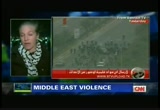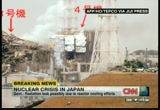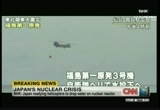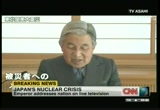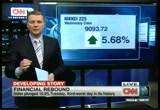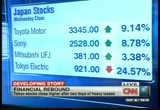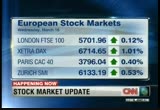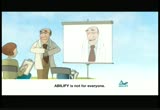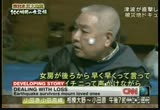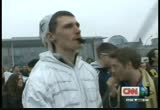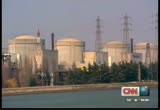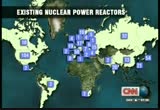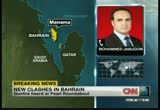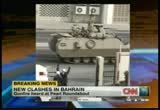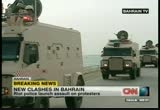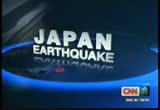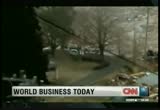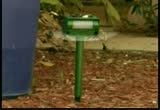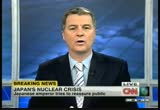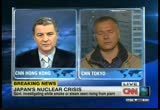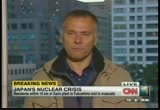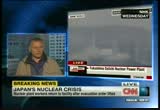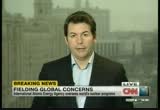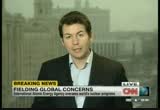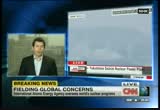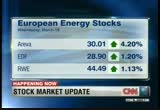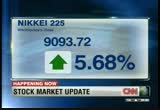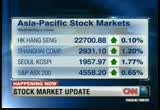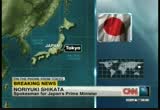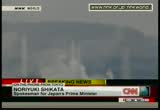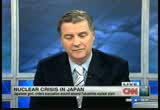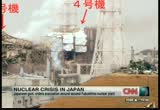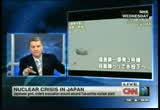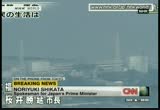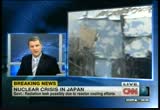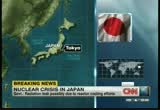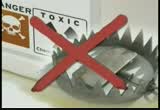tv World Business Today CNN March 16, 2011 4:00am-5:00am EDT
4:00 am
few weeks ago we did see demonstrators who were approaching security forces chanting peaceful peaceful. now we have a situation where saudi is sending in troops and certainly very disturbing developments. >> thank you very much >> tomorrow morning, i'll be reporting from the middle east. i'll be flying to israel.
4:01 am
good morning from cnn london, i'm nina del santos. >> and i'm andrew stevens, and you're watching a special edition of "world business today" with continuing coverage of the disaster in japan. and just moments ago, a somber message from japan's emperor in a rare but brief public address live on television. the emperor said he was praying for the safety of those affected by last week's devastating earthquake and tsunami. the japanese government is telling residents within a 10-kilometer radius of a second nuclear plant to evacuate. meanwhile workers have returned to the fukushima daiichi nuclear plant after the government lifted a plant evacuation order because radiation levels were dangerously high. concern continues to grow over
4:02 am
the safety of spent nuclear fuel rods at that facility. and authorities are investigating the cause of white smoke or possibly steam rising from the plant's number three nuclear reactor. a top government official says radiation levels around the plant still fluctuate, but it's unclear why. >> translator: one thing i would like to confirm, now this increase in radiation reading and in number three reactor, the containment vessel is it possible that the containment vessel has failed? well, number three reactor needed to have water injected. and for that, we need to release the air because the pressure was building up. and so by releasing air, the radiation could have leaked. and that is the method that we need to take. so there is a possibility that the radiation is coming out through that process. >> well, meanwhile, helicopters
4:03 am
have taken to the air in japan in an effort to contain the crisis at the daiichi plant in fukushima. nhk says two helicopters being dispatched to the plant, one to monitor radiation levels, and the other to dump water on that e reactor. nina? well, senior international correspondent stan grant has been monitoring the rapidly changing developments at the fukushima plants. he joins us live from the tokyo bureau. what's the latest? this is a fast-changing picture, isn't it? >> reporter: it certainly is. what i want to bring you, first of all, is this address to the people by the emperor. this is an extraordinarily rare event. and this was a taped video message played across television networks where he talked about how he cares for the people. the people need to support -- saying the people of japan
4:04 am
together can rebuild an even stronger country. separate from the actual taped video message, he also sent a message to the television that we're expecting -- brought to the people, of course. >> stan grant there joining us from tokyo. andrew? well, obviously some very windy times there up in tokyo at the moment, which could be good or bad for the residents of tokyo. radiation levels in the city already certainly higher than normal. also in tokyo today, some good news finally in the financial markets. after two days of major losses on the tokyo stock exchange, today a change of mood. the panicked selling of yesterday replaced today by buying. and this is how the nikkei ended the day up 5.7%. and that's not an unhealthy rise at the battering it took, down
4:05 am
6.2% on monday, 10.5% on tuesday. and we see this bounce today. a lot of the traders were saying at the end of the session yesterday that maybe the selloff, which was a panic selloff yesterday where people were dumping stocks indiscriminately, would be falling off. and interesting to see some of the big movers today. they were some of the household names. this is what the kninikkei has done. starting on monday morning, you see a fairly sharp selloff to about there. and then it sort of takes off down there. this is after naoto kan started speaking yesterday about the possibility of more radioactive leaks from the fukushima plant. it came right down here, that was a 14.4% drop yesterday, it then recovered, ended around about there yesterday, and then it picked up. and it's picked up today as you
4:06 am
see 5.8% or so. who have been the winners? let's just see if we can get these up. okay. these are today's closing prices for the big stocks. toyota, sony, mitsubishi ufj, there has been quite a bit of buying in the household names. to see toyota up by 9% is a big move. but it's very early days at the moment. no one's calling this a trend. it's a rebound after two bad days. no one's calling it a trend. tokyo electric down for the third day in a row. it can only fall as much as 25% in a single day. it's done that for the third day in a row. so certainly people continuing to bow out of that one. and as i say, it's difficult to say whether we're seeing the start of a turn around given we don't know what's happening in fukushima. on the other big market, which analysts are watching very closely, the currency markets, the yen has been soaring against
4:07 am
the u.s. dollar since the earthquake hit. it's up about 3% against the dollar. it was already in the danger zone. and by that i mean dangerously strong against the u.s. dollar. and today it hit 80.9. that means it came off a little bit, but still just about -- a little bit more than one yen outside the record strength against the u.s. dollar. one analyst says that the strength of the yen based on the levels if it gets stronger, is going to have a bigger impact on toyota than the actual earthquake and tsunami. against other currencies, the dollar trading $1.39 and at 1.60. and around the rest of the region, the market's following tokyo's lead. mining and mineral stocks, big wins in sidney, shares so far some coal and copper markets helping hong kong and shanghai. of course we had stan grant just updating us there on the ground in japan when it comes to what the government's doing and the nuclear fallout, but what
4:08 am
are we hearing about the impact on the global economic growth in japan? >> well, it's a little bit difficult to say at the moment, there's going to be some sort of knockdown effect. but the brokerage reports are talking about a first quarter growth hit. and the first quarter is the first three months of this year. a hit of maybe about .5%. which would bring it down to 1.7% growth. it's still growth, not recession. the second quarter, the hit might be a little bit stronger. people are saying that 2.2% growth may be ratcheted back to about half. quite a bit of damage for the second quarter. and then we get the kick-in of the reconstruction, nina. but there is going to be lower growth without doubt in both this current quarter and the following quarter. that will have some sort of
4:09 am
knockdown effect. the other thing to look out for. just how well trade is going to be interrupted. japan obviously produces very high-end components as well as finished products for other high-end manufacturers. and if you can't get that stuff out because the ports are ruined or because transportation's been disrupted, it is going to be a problem. that's also something that japanese have to contend with. wherever you look, it's no good news. yesterday, european stocks followed asian shares sharply lower on concerns that as you were just saying, that earthquake and subsequent tsunami in japan would affect companies' supply chains and also some of their sales in what is one of the most important lucrative markets. stock markets fell from london to germany. here's how we stand at the moment in the first nine minutes of trading. and as you can see, all of those markets sharply rebounding. a number of energy companies suffered yesterday, not least the french nuclear power
4:10 am
company, the world's largest nuclear power company suffering to the tune of 8.5%. a number rebounding as you can see and that's helping the cac 40, strongestga esest gains com the zurich. the unfolding crisis in japan are keeping u.s. investors on edge, as well. here's how things looked at the close of trade. shedding more than 1% in total. alison kosik with more in new york. >> investors dumped any shares associated with japan. general electric fell for a second day in a row losing more than 1.5%. ge designed the reactors at the fukushima complex. the insurer draws 3/4 of the revenue from the japanese market. hartford financial, prodential
4:11 am
and metlife. investors are fearful the pullback could be the beginning of a long anticipated pullback. it was helped a bit near the end of the session thanks to the federal reserve's statement from the latest policy meeting. the u.s. central bank held key benchmark rates steady on tuesday and says the recovery is on quote firmer footing. >> u.s. market looks set for a higher open when trading begins later on wednesday. this is where we stand in the pre-market action and current futures indicate that the dow jones industrial average could open up by about .1%. and also the broader s&p up by about .33%. we'll take a look at the commodity markets. the price of oil is up again. it had been surging above $100 a barrel in recent weeks on supply
4:12 am
concerns coming from the middle east and north africa, but the earthquake in japan sent those prices falling. right now nymex crude is up 80 cents a barrel. brent crude is up $1.60, it's trading at $109 a barrel. investors are also turning their attention back to safe haven commodities like gold in particular. gold up $6.50 an ounce trading at just over $1,400 an ounce. well, cesium is potentially a deadly chemical element. which japanese officials are trying to contain at the fukushima nuclear power plant. if they fail, could cesium get into the food chain? and also, will japan' crisis force the world to reassess international nuclear policy? that's also straight ahead. stay with us on "world business today." salty nut bars... they're made from whole roasted nuts and dipped in creamy peanut butter, making your craving
4:13 am
for a sweet & salty bar irresistible, by nature valley. ♪ [ male announcer ] what are you gonna miss when you have an allergy attack? benadryl® is more effective than claritin® at relieving your worst symptoms and works when you need it most. benadryl®. you can't pause life. should i bundle all my policies with nationwide insurance ? watch this.
4:14 am
on one hand, you have your home insurance with one company. and on another hand, you have your auto with another. and on another hand, you have your life with another. huh... but when you bundle them all together with nationwide insurance... ... they all work together perfectly-- and you could save 25%. wow... it's all in the wrists. ♪ nationwide is on your side before i started taking abilify, i was taking an antidepressant alone. most days i could put on a brave face and muddle through. but other days i still struggled with my depression. i was managing, but it always had a way of creeping up on me. i felt stuck. i just couldn't shake my depression. so i talked to my doctor. he said adding abilify to my antidepressant could help with my depression, and that some people had symptom improvement as early as 1 to 2 weeks. he also told me about a free trial offer from abilify! now i feel more in control of my depression. [ male announcer ] abilify is not for everyone. call your doctor if your depression worsens or if you have unusual changes in behavior,
4:15 am
or thoughts of suicide. antidepressants can increase these in children, teens and young adults. elderly dementia patients taking abilify have an increased risk of death or stroke. call your doctor if you have high fever, stiff muscles and confusion to address a possible life-threatening condition. or if you have uncontrollable muscle movements, as these could become permanent. high blood sugar has been reported with abilify and medicines like it. in some cases, extreme high blood sugar can lead to coma or death. other risks include decreases in white blood cells, which can be serious, dizziness upon standing, seizures, trouble swallowing, and impaired judgment or motor skills. depression used to define me, then my doctor added abilify to my antidepressant. now, i feel better. [ male announcer ] if you're still struggling with depression talk to your doctor to see if the option of adding abilify is right for you. and be sure to ask about the free trial offer.
4:16 am
>> translator: i have a bad leg, so my wife was behind me cheering me on saying, one, two, one, two. the voice stopped. so i looked back and she was not there. she's dead. when i went back to get my stuff, she was lying down in the foyer. >> earthquake and tsunami survivors in japan continue to deal with losing everything as the country struggles to cope with the earthquake and subsequent tsunami disaster. the latest official death toll has now surpassed 3,600 and rescue efforts are ongoing. welcome back to "world business today" as our japan coverage continues here on cnn. in the light of nuclear radiation problems in japan, governments around the world are taking a closer look at their own nuclear policies and safety standards. fred pleitgen has more on that. >> reporter: the nuclear meltdown scare in japan is causing fear as far away as
4:17 am
germany. thousands protested on monday calling on their government to shut down all german nuclear power plants immediately. >> since this happened now in japan, i am thinking it's really, really time to stop using nuclear energy. >> whenever -- well, we have technology that is used by mankind, there are mistakes that will lead to disasters. >> reporter: angela merkel has reacted ordering a safety review of all german nuclear plants in the next three months. seven of the country's 17 facilities will be shut down during this period. >> translator: the power plants that went online before the end of 1980 will be shut down as long as the moratorium is in place, she said. they will not produce electricity. as the world watches the events in japan, many countries are reviewing their own nuclear policies. in europe, france is the most
4:18 am
dependence on atomic energy. the country gets more than 75% of its energy from nuclear plants. paris says it will not change its policy, but that it will conduct safety reviews of its reactors. meanwhile, the eu says energy companies have agreed to develop stress tests for plants in europe. >> we want to look at the risks and the safety issues in light of events in japan. and carry out a reassessment. i think that the time has come for that, and we feel the stress test is the right instrument to proceed on with that. >> reporter: nuclear power is also fueling global economic growth, especially in emerging economies. china alone has 27 reactors under construction. the country says it is reviewing safety standards in reaction to the crisis in japan. and some believe that the future might be called into question
4:19 am
depending on how bad things get in japan. >> for the short-term, there will be a major reassessment. it will be toned down considerably. whether we actually withdraw from nuclear power is uncertain. we would have to work hard to replace the electricity that was lost if we shut them down immediate live. >> reporter: nuclear power plants in germany adhere to the highest safety standards. but weath whether that's enough will probably be decided in japan. fred pleitgen, cnn, berlin. here's an idea of how widespread nuclear power is. it accounts for about 15% of the world's electricity. the international atomic energy agency, the iaea counts 432
4:20 am
nuclear reactors. the u.s. has the largest number of commercial reactors, 104, france has the second highest with 58. japan has 54. china has 13 reactors to generate power, but leads the way under construction with 27. russia is building 11 new reactors while india and south korea each have five under construction. almost half the world's commercial nuclear reactors gain operation in the 1980s. we have 218 coming online in that decade. and one last figure for you, more than 155 nuclear power plants are planned for the future. and double that number have been proposed. let's cross now to hour meteorologist jennifer delgado to find out exactly how the weather situation is affecting the search and rescue operations in japan. jen, good morning to you. we heard from stan grant earlier on in the show.
4:21 am
and we could just hear on the line the wind from tokyo. what else can you tell us about the wind and how it's affecting the spread of radiation from that damaged plant? >> you're right. and the winds have been quite gusty over the last 12 hours. look at those winds, 44 kbh coming from the u.s., 44 in tokyo. certainly very windy out there, but we actually like to see this because this wind is coming offshore as opposed to what we saw yesterday when we had that onshore flow that was helping to spread some of that radiation across parts of the populated areas across japan. as we go through the next 24 to 48 hours, as we go through the remainder of today, thursday, and friday, the winds still out of the northwest, that's good news, that's going to continue to push any of that radioactive material over towards the east offshore. so that means the populated area is actually going to get a break. we're still dealing with snow out there. and this system right here is going to bring another helping as we go through today and even for tomorrow, it'll be heaviest up towards the north.
4:22 am
and i want to show you some video coming out of areas along the eastern coastline of japan. as we go over to the snow video, you'll see how bad it is. this is a rescue and search operation. when you add in cold temperatures and snow, it gets worse. this region right here, yes, dealing with snow. for today, we're going to be done with the snowfall, but keep in mind, very cold. as i take you back over, i want to show you some of the temperatures out there. we are seeing temperatures feeling like below freezing, minus 5, all the way up towards akita and we'll continue with those single digits through today. tonight, temperatures fall below freezing and temperatures are going to be cool for really tomorrow as well as even through friday. we'll start to see those numbers rebound through saturday. and typically we should see a temperature around 9 degrees for thursday, 3, friday, 6, back up to 11 as we head into saturday. more "world business today" coming up in a moment.
4:25 am
live from cnn hong kong in london, this is "world business today." now, we want to break away from the crisis in japan for a moment and tell you about the deteriorating situation in the middle east. violence continues in bahrain where the shia majority are protesting economic hardship and discrimination. now we're hearing that bahraini security forces have opened fire on demonstrators gathered in manama. that comes two days after people were killed. on the line now with mohammed from manama. and i understand you're hearing that the security forces have been attacking a hospital, as well? >> that's right, andrew. just a short while ago we spoke with two doctors at the medical complex, one of the main hospitals here in manama. they told us that the hospital
4:26 am
has been besieged since this morning. saying security forces had surrounded the hospital around 5:30 a.m. today. they were not letting anybody in and were not letting doctors or patients inside the hospital out. and one of the doctors i spoke with sounded quite scared. saying he was going room-to-room hiding because the security forces had entered the hospital in the past hour and they were beating personnel and the doctors and staff were quite afraid from their safety. and they were trying to get the word out to call the security forces to please exit the hospital and let them resume their work. >> why would they attack this hospital? >> we've been trying to get more information from hospitals in the area today to find out the number of casualties. we've heard from one doctor that there are at least two people that died in the clashes that happened today. as many as hundreds injured what we're hearing right now. when this has happened in the
4:27 am
past, typically if there is a crackdown, we've seen the security forces do not want to allow people into hospitals. whether that's going on today in bahrain, we're not sure. we have not gotten any government confirmation or statements about this. if they're denying surrounding the hospital. but typically, when opt access is blocked, it's so that people can't find out about injured. again, we don't know if that's the case right now. why they would enter it. and the doctors we spoke with said they have no idea why they would have been attacked, why the hospital would have been entered forcibly, that's what they're trying to find out, as well, andrew? >> days of this crackdown now, mohammed, is it clear whether saudi troops have been involved in this activity? >> they have told me in the past 48 hours that the troops they sent in as part of the force that they are not involved in trying to do any kind of anti-riot policing, that they
4:28 am
are not going to confront demonstrato demonstrators. yesterday they released a statement saying their forces were protecting two installations in the country's south. we have not heard anything further on that. and now there have been some conflicting reports today, some people suggesting that there were gcc troops in manama. everybody i've spoken with has said that is not the case, they are not going to be confronting any of the demonstrators. that is up to the bahrainis. but this is a question that will be asked a lot. there's a lot of tension surrounding this particular issue. because when you have a country that's majority shiite, when you have a sunni army where armies coming in, forces coming in from sunni countries with neighbor bahrain, that's seen as a provocative action and causing concern among opposition and protesters. andrew? >> mohammed jamjoom from manama,
4:29 am
thank you for that. nina? let's go -- let's go back to japan now. for the past five days, pictures have shown the horror of the tsunami. and now this. this is the exact moment that the first waves came ashore in this city. this is a port town in the prefecture and it was wiped off the map in the tsunami. well, people on higher ground you can see watch in horror as the giant wall of water and debris engulfs the homes below reducing the town's population of 17,000 people to -- as i was saying -- that town of 17,000 people to rubble. just a few structures remain school high on the hill and also a four-story hospital remaining there in that town which had previously population of 17,000 people. we'll, of course, have more in a
4:33 am
4:34 am
crisis. the emperor made a rare television address on wednesday hoping to reassure his people. emperor akihito said he was praying for japan and "for as many people as possible." the situation at the troubled daiichi nuclear plant in fukushima is unclear. this photo just released shows the massive damage to the housing reactor. the government's investigating white smoke or it could be steam that has been seen pouring from that plant. an official speculator that it might be caused by the release of air from inside the reactor. the japanese broadcaster nhk says helicopters are dumping water on one of the reactors. japanese officials also say it's likely that the vessel meant to contain nuclear material at one of the reactors may have been compromised. let's get back now to our senior international correspondent stan grant at cnn's tokyo bureau.
4:35 am
and stan, you were saying a little earlier in the hour before we had audio problems that this is such a rare event of the emperor of japan to address his people. >> reporter: it really is, you know. it comes during a time of crisis. during the kobe earthquake in 1995, he visited a gymnasium, walked among the people there, the survivors of that quake and shared some of their stories. and now he's reached out again via video message, which we broadcast on the television networks here where he mentioned how much he deeply cares about the people. saying the people need to come together and support each other at this time. he also thanked the international community for its thoughts and support. and says if the people can keep up hope, they can rebuild an even better japan. also addressed the nuclear situation saying he remains deeply concerned about the unpredictable nature of this crisis. and he said i sincerely hope we
4:36 am
can stop this situation from getting worse. and that's precisely what's been going on. the situation getting worse. but it's hampered by these constant changes, these constant developments. you mentioned earlier this cloud that was seen about reactor number three. they're still trying to ascertain whether it was smoke, whether it was gags being released. but the concern about the containment vessel which surrounds the reactor and keeps the radioactive material inside there in the event of a full meltdown. so that's a major concern. and also the concern about the fire in reactor number four. because there was a pool there, a pool of water housing spent fuel rods. and one of the concerns is that water may be overheating and may be dispersing. and as a result of that, the rods being compromised to some degree because of the fire. and that would, again, put more radioactive material into the air. it's just an ongoing situation to try to monitor that. you mentioned the helicopters
4:37 am
involved in this checking the radiation perhaps about to dump some water, as well. the radiation levels continue to spike and then they drop down again. we also heard from the fukushima, the government in fukushima talking about water supply there. now, by a detected very, very small traces of cesium and iodine in the water. now, we've talked a lot about this. these are radioactive materials that are actually created with inside the core of the reactor. with all of this seeping into the atmosphere, people are concerned about what it actually contains. they are saying they have detected small traces of this. but the water is still safe to drink, and you're not coming to any harm. it's not enough to cause any illness. when you keep hearing stories like this and more radiation and concern about what's happening at the plant, workers being evacuated and workers coming back in. it certainly raised a lot of concern. and that's what the emperor was trying to address today. to try to calm people, saying
4:38 am
they need to work together during this time of crisis. >> hearing a lot of anecdotal evidence. that it's getting out of japan and heading to countries around the region. thank you very much for that, stan. nina? well, the full magnitude of the crisis in japan is still unknown, but the images and stories coming out of the country, of course, raising serious concerns about the safety of nuclear power plants right across the world. matthew chance now joins us from moscow to explain exactly how the world's atomic regulatory agency, the iaea is fielding some of those worries. matthew, what exactly is the iaea doing at the moment? i understand they don't actually have anybody on the ground in japan. >> no, and that's quite surprising because often the iaea has a branch offices in various countries where it carries out its activities. it doesn't have, i learned
4:39 am
earlier, staff members on the ground in japan. and that has consequences of the quality of information that the iaea has been reporting. one of the things it's mandated to do this u.n. watchdog agency is, you know, facilitate the exchange of verified, authenticated information from a crisis situation such as this unfolding and continuing to develop in japan, but it seems in this case, what they're doing is merely passing on that information to the rest of the world. that would be fine, of course, but there's a sense of a lot of concern the japanese nuclear authorities on the ground have been perhaps not coming entirely clean and not being totally up front with the extent of the crisis. for instance, back in march -- sorry, back on the 11th of this month, when the earthquake struck, the information from the japanese authorities was that all of the reactors in the vicinity of the disaster zone
4:40 am
had been safely shut down. and of course, as we now know, that's not the case. and so it also raises questions about the quality of the rest of the information we've been getting from the japanese through the iaea since then, as well, nina. >> presumably, obviously the iaea will be looking carefully other government's plans to inspect the safety facilities of their nuclear operations. the japan disaster has shown us that we really do need to reassess securities on these plants, don't we? >> well, it seems so. there's certainly been questions raised about whether the nuclear reactors in japan, many of which were very modern were built to the appropriate levels of safety given it's an area of such acute seismic activity. other countries, as well, notably germany, but others, as well, have independently decided to assess the safety of their own nuclear facilities.
4:41 am
germany's even taken the step of temporarily taking the reactors built before 1980 offline while it reviews their safety. and so, yes, there is a great deal of concern as the world watches this unfolding crisis in japan about the safety of countries of nuclear facilities in other countries, as well. and that's something the iaea say that they're going to be advising their member states on. >> thanks very much for that update. let's take another look at how the european markets stand at the moment. we're 41 minutes into today's trading session, and after the heavy losses yesterday, as you can see, some of those markets rebounding. ftse 100 virerging on negative territories. areva, the largest nuclear power provider listed in the french market rebounding after a fall
4:42 am
of 8.5% yesterday in yesterday's session. and, of course, we had edf also falling heavily yesterday, another major provider of energy to the rest of europe and, of course, france with its own nuclear operations. as you can see, that stock rebounding to the tune of 1.2%. rwe of germany also up by 1.1% and obviously all of that important in the light of what matthew was saying. a number of countries around the world reassessing the safety of their own nuclear operations, indeed shutting some down as matthew said in germany. and that has a huge impact in how some of the countries will be getting their power. that in turn has an effect on listed companies in the stock markets. >> it does, nina. you're talking about the rebound there, there was a much bigger rebound and certainly a very happy for many investors in japan today seeing the nikkei turn around after two days of a sharp fall.
4:43 am
10.5% down yesterday, and that's what happened today, the nikkei closing 5.7% higher today. there was some bargain hunting. that is what traders are saying. this is what it's all about. basically, such a big selloff, panic selling yesterday. everything was being dumped, basically. buyers coming in today, companies -- big companies like toyota getting a boost, sony up nearly 9%, toyota the same. a lot of people thought this selloff had been overdone coming in today to pick up what they consider bargains. it's difficult, though, nina, given the fact we don't know what's happening at that fukushima plant and we'll see a resolution of that. certainly it was good to see for the japanese investors. around the rest of the region, not surprisingly, tokyo gave the lead to the others to follow the korean index kospi.
4:44 am
miners and mineral stocks the big winners in sidney. coal and copper markets helping to lift here in hong kong and also in shanghai. quite a ways south of japan's disaster zone, but the mood among many in tokyo does seem to be growing despair. this is the scene at the japanese capital's main international airport. and people as you see are trying to get out. queueing patiently at many major airlines that have stopped or rerouting their traffic in and out of tokyo, which is causing those jams at the airport for people trying to get out. now, we're just getting some news coming into us here at cnn on a different matter. the cia contract. the u.s. cia contractor raymond davis has been formally charged with two counts of murder by a court. that's just been confirmed to cnn. now davis was arrested back in january after allegedly shooting two people at a traffic stop in
4:45 am
4:48 am
welcome back. you're watching cnn's special coverage of the disaster in japan. and joining us right now on the line from tokyo is a spokesman for the japanese prime minister naoto kan. thank you so much for your time in what must be a busy period for you. i want to ask you, first of all, is the situation at fukushima out of control? >> well, i would not characterize the current situation as out of control. we do have some challenges continuing. and today, we had the -- some
4:49 am
fire coming for unit four. and there are other units, you know, that are undergoing some challenges. >> now, you say it's not out of control, but obviously it's not under control either. how would you describe the situation there? >> well, i would say that fukushima daiichi is facing difficulties. and we are taxing this situation. >> do you think that you are actually getting to a stage where you are getting this under control? the situation there? >> well, we have been monitoring, for example, the level of radioactive levels surrounding those units. and we have seen that in spite of some of the troubles, we have
4:50 am
seen the level of radioactivity's declined some time after. >> reporter: the level of radiation does seem to spike. it declines and rises rapidly again. why do your knowledge is this happening? >> reporter: well, this is something that is difficult for us to identify at this juncture. we are looking into what is the actual causes for those radioactivity. in the past where we saw a blast over hydrogen blast, we found out that that was the result of venting to emit air from inside, which would contribute to control the pressure inside. >> there are reports today that white smoke or perhaps steam is coming out of reactor number three, and that reactor number
4:51 am
three at fukushima -- the actual containment vessel itself, the vessel around the reactor core may have been breached. what is your knowledge of the situation on reactor number three? >> well, it is true that kind of white smoke or steam has been continuing. i guess even now there's some limited emission of steam. and -- at the same time, based on the radioactivity monitoring in the vicinity, it has been established. at 5:00 p.m., 1.6 millisieverts per power. >> does that say to you that the containment vessel has not been breached? can you tell us that? >> well, we will look into the
4:52 am
actual situation. and i would not -- you know, want to judge the actual conditions. but so far, the indicators lead us to think that the situation is stabilize d. >> reports that helicopters are being used over the fukushima plant. can you tell me what their purpose is? >> well, of course we have to inject the water. and there are different methods to do that. and we are trying to get the water by the firefighter vehicles and we are trying our best to cool down the fuels. >> so you're bringing water in to be -- to be dumped on the ground where the staff -- the
4:53 am
people at the reactors will use the water. you're not actually dumping it straight on the reactors from the helicopter? >> well, this is the purpose of this injection or pouring water is to cool down. the used fuel, which inside the used fill pool. >> now, you have been using sea water. does this suggest that the sea water cooling system has failed? >> well, we are making, you know, use of sea water, as well. and this is something which is necessary. you know, we are both used pure water and sea water, but -- and we know some implications of using sea water. >> how then would you describe the situation right now at the plant? >> well, at the plant, you know,
4:54 am
still -- we as i said there are challenges that we have to tackle. and we are continuing to do that. overall the situation is that we have taken appropriate measures in terms, for example, evacuation of residents in the 20-kilometer radius. and in accordance with the international health guidelines. >> now, there has been evacuation of staff today, staff have also returned as i understand it. there's about 50 staff there now fighting this nuclear crisis. has the prime minister spoken to these people? >> well, you know, it is difficult for prime minister himself to directly talk with those workers, but it is prime minister yet was visiting the
4:55 am
headquarters of the tepco, the tokyo electric power company. and we have now established a joint headquarters between the government and the tepco itself. >> now, that would be a long time after the initial crisis to establish such -- what would appear to be -- a very fundamental thing, a joint task force. why has it taken so long? >> well, what i'm saying is we are taking extraordinary steps to come up -- to locate joint headquarters inside the company itself. and our officials are going to tepco itself. and to -- and engaged in the challenge of coping with the situation together. >> there was a quote attributed to the prime minister in the newspapers today saying after a meeting with tepco officials, he
4:56 am
asked them "what the hell is going on?" that does suggest that the prime minister is very frustrated by the level of information and the level of operation he's getting from tepco. is that correct? >> well, i -- i do not know whether that quote itself is right. but we do realize the need to share information at the same time. and that's the background behind the creation of joint headquarters. and we need to operate together and the government involvement strengthened in tokyo and on the side. >> there's also radiation, rising radiation levels now in tokyo. this must be obviously of great concern to you as the -- you must be great concerned about the fukushima plant, as well. what are you advising residents
4:57 am
of tokyo and expatriots who live in tokyo to do? >> well, as a result of places like tokyo, i don't have any concerns. in terms of the result of the monitoring. the level of radiations. so this is something which, you know, the japanese people are not reacting. and we don't have any reason, for example, to leave tokyo. >> okay. we'll have to leave there. the prime minister's spokesman. thank you very much for joining us here at cnn. and you are watching our continuing coverage of the disaster in japan. we'll be back in just a moment.
318 Views
IN COLLECTIONS
CNN Television Archive
Television Archive  Television Archive News Search Service
Television Archive News Search Service 
Uploaded by TV Archive on

 Live Music Archive
Live Music Archive Librivox Free Audio
Librivox Free Audio Metropolitan Museum
Metropolitan Museum Cleveland Museum of Art
Cleveland Museum of Art Internet Arcade
Internet Arcade Console Living Room
Console Living Room Books to Borrow
Books to Borrow Open Library
Open Library TV News
TV News Understanding 9/11
Understanding 9/11